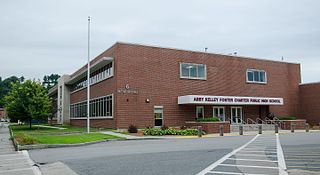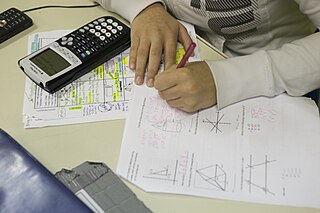
The Florida Comprehensive Assessment Test, or the FCAT/FCAT 2.0, was the standardized test used in the primary and secondary public schools of Florida. First administered statewide in 1998, it replaced the State Student Assessment Test (SSAT) and the High School Competency Test (HSCT). As of the 2014-2015 school year FCAT was replaced in the state of Florida. The Florida Department of Education later implemented the Florida Standards Assessments (FSA) for English Language Arts, Reading, Mathematics and a Writing or typing test. A Comprehensive science test is still used for grades 5 and 8.
In New York State, Regents Examinations are statewide standardized examinations in core high school subjects. Students were required to pass these exams to earn a Regents Diploma. To graduate, students are required to have earned appropriate credits in a number of specific subjects by passing year-long or half-year courses, after which they must pass at least five examinations. For higher-achieving students, a Regents with Advanced designation and an Honors designation are also offered. There are also local diploma options.
Mathematics education in New York in regard to both content and teaching method can vary depending on the type of school a person attends. Private school math education varies between schools whereas New York has statewide public school requirements where standardized tests are used to determine if the teaching method and educator are effective in transmitting content to the students. While an individual private school can choose the content and educational method to use, New York State mandates content and methods statewide. Some public schools have and continue to use established methods, such as Montessori for teaching such required content. New York State has used various foci of content and methods of teaching math including New Math (1960s), 'back to the basics' (1970s), Whole Math (1990s), Integrated Math, and Everyday Mathematics.
The Regional Science High School Union (RSHS-Union) is a specialized system of public secondary schools in the Philippines, established during the academic year 1994-1995. It is operated and supervised by the Department of Education, with a curriculum heavily focused on math and science. It remains within the ambit of the Department of Education, unlike the specialized science high school system of national scope, the Philippine Science High School.

Core-Plus Mathematics is a high school mathematics program consisting of a four-year series of print and digital student textbooks and supporting materials for teachers, developed by the Core-Plus Mathematics Project (CPMP) at Western Michigan University, with funding from the National Science Foundation. Development of the program started in 1992. The first edition, entitled Contemporary Mathematics in Context: A Unified Approach, was completed in 1995. The third edition, entitled Core-Plus Mathematics: Contemporary Mathematics in Context, was published by McGraw-Hill Education in 2015.
Jacksonville High School (JHS) is a secondary public school located in Jacksonville, Arkansas for students in grades nine through twelve. JHS serves students in the Jacksonville and McAlmont communities and is administered by the Jacksonville North Pulaski School District (JNPSD). The school was previously in the Pulaski County Special School District. In 2007, Jacksonville requested to become separated from the PCSSD and form its own school district, but a final decision had not been made on that request.
The End of Course Test is an academic assessment conducted in many states by the State Board of Education and Island of Bermuda. Georgia, for example, tests from the ninth to twelfth grades, and North Carolina tests for any of the four core class subjects.

Vincent Memorial Catholic High School is a private, Roman Catholic high school in Calexico, California. It is located in the Roman Catholic Diocese of San Diego The school serves approximately 300 students.

Abby Kelley Foster Charter Public School is a K–12 school located at 10 New Bond St., Worcester, Massachusetts, United States in former Heald Machine Company buildings. The school was founded in 1998.
Caraga Regional Science High School is a public school in San Juan, Surigao City, Philippines. It is the leading school in the Division of Surigao City with high MPS during the annual National Achievement Tests (NAT), and has been consistent in making its name in Division, Regional, National and International level contests.

Mathematics education in the United States varies considerably from one state to the next, and even within a single state. However, with the adoption of the Common Core Standards in most states and the District of Columbia beginning in 2010, mathematics content across the country has moved into closer agreement for each grade level. The SAT, a standardized university entrance exam, has been reformed to better reflect the contents of the Common Core. However, many students take alternatives to the traditional pathways, including accelerated tracks. As of 2023, twenty-seven states require students to pass three math courses before graduation from high school, while seventeen states and the District of Columbia require four. A typical sequence of secondary-school courses in mathematics reads: Pre-Algebra, Algebra I, Geometry, Algebra II, Pre-calculus, and Calculus or Statistics. However, some students enroll in integrated programs while many complete high school without passing Calculus or Statistics. At the other end, counselors at competitive public or private high schools usually encourage talented and ambitious students to take Calculus regardless of future plans in order to increase their chances of getting admitted to a prestigious university and their parents enroll them in enrichment programs in mathematics.
Wilmington Area High School is a public school in New Wilmington, Pennsylvania, that teaches grades 9 through 12. It is part of the Wilmington Area School District. Enrollment usually fluctuates between 450 and 500 students every year. The mascot of the school is a Greyhound. Many sports and extracurricular activities are offered in the school.
Charleston High School is an accredited comprehensive public secondary school for students in grades 7 through 12, located in the city of Charleston, Arkansas, one of two county seats in Franklin County. The school is the sole high school managed by the Charleston School District.
Gurdon High School is an accredited comprehensive public high school serving students in grades six through twelve in the rural community of Gurdon, Arkansas, United States. It is one of three public high schools in Clark County and serves the communities of Gurdon, Okolona, and Whelen Springs. With more than 200 students, it is the sole high school of the Gurdon School District.
Manila High School is an accredited and nationally recognized comprehensive public high school for students in grades 9 through 12 located in Manila, Arkansas, United States. Manila High School is one of six public high schools in Mississippi County and the only high school of the Manila School District. For the 2010–11 school year, the high school instructed more than 280 students with more than 23 classroom teachers employed on a full time equivalent basis.
Paris High School is a comprehensive public secondary school located in Paris in Logan County in western Arkansas, United States, for students in grades nine through twelve. Paris is the sole high school administered by the Paris School District.
Bradley High School (BHS) is a comprehensive public junior/senior high school located in Bradley, Arkansas, United States. For the 2017-2018 school year, BHS serves more than 24 students in grades 7 through 12 and is supported by more than 15 educators on a full time equivalent basis. Bradley High is the smaller of two public high schools in Lafayette County and draws students from Bradley. It is one of three high schools of the Emerson-Taylor-Bradley School District.
Murfreesboro High School is an accredited public high school serving students in grades seven through twelve in the rural community of Murfreesboro, Arkansas, United States. It is one of three public high schools in Pike County. With more than 200 students, it is the sole high school of the South Pike County School District.

Weiner High School was a comprehensive public high school for students in grades 7 through 12 in Weiner, Arkansas, United States. Weiner was one of five public high schools in Poinsett County and one of two high schools in the Harrisburg School District. It closed in 2013.
LISA Academy is an open-enrollment public charter school headquartered in Little Rock, Arkansas, United States. Formed in 2004, LISA or Learn Innovate Support Achieve serves more than 2200 students in grades K through 12. A STEM focused charter campuses are located across the state of Arkansas. With college and career focused education LISA has been recognized as one of the top ranking schools in the state of Arkansas US News






